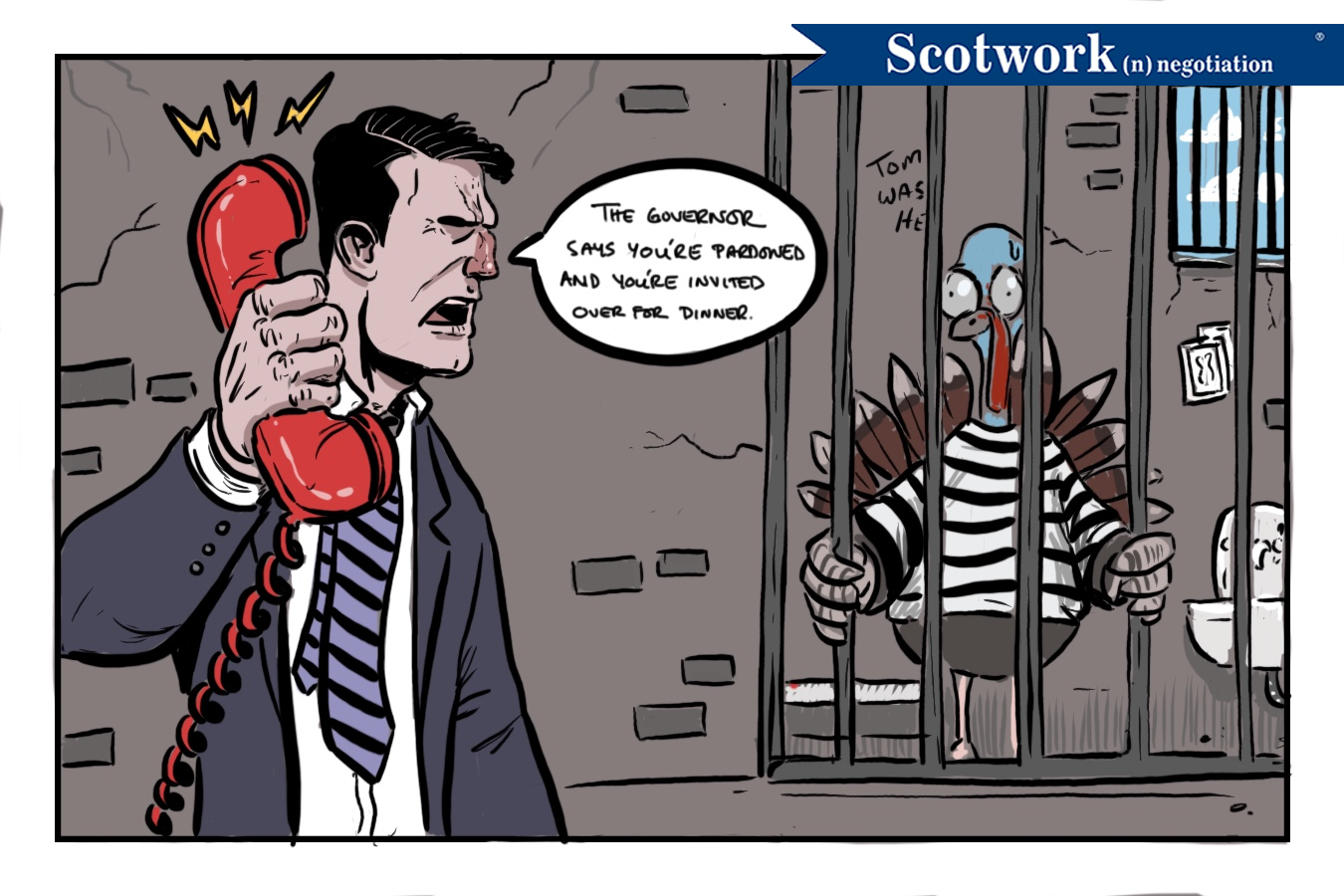I find it ironic that we have a tradition of pardoning a turkey at Thanksgiving. After all, these days our political landscape shows few signs of forgiveness. Nevertheless, the symbolic nature of the pardon is important. Coming together with families and friends during the holidays can be an emotional experience. Part of that has to do with our inability to forgive. Doing some research into the power of forgiveness, I stumbled on something that can also help negotiators trapped in situations of emotional conflict.
Skilled negotiators know how to keep their emotions in check. They rarely show emotion at the dealmaking table and can maintain an objective point of view throughout a negotiation. I’ve also observed that they are quick to forgive the other party’s transgressions. My theory is that holding grudges leads to emotional decisions that are counterproductive for the skilled negotiator.
Contrast a skilled negotiator with an emotional negotiator — one who struggles to forgive and, instead, carries a grudge. According to a Forbes.com article about the power of forgiveness, our emotional state leads to physical changes that can, in turn, lead to impulsive behavior. When we feel wronged, we release higher levels of different hormones and neurotransmitters, so our bodies become overwhelmed by adrenaline and other chemicals, creating an impulsive rush to respond. This means that an emotional negotiator is more apt to respond negatively to a situation than a skilled negotiator. Therefore, it’s not unreasonable to conclude that learning to forgive creates power at the negotiating table.
So how do we do it? Forgiveness is not always easy. Harvard Medical School published an article in their Men’s Health Watch that puts forth a method for forgiveness, called REACH, which I’ve adapted here for negotiators:
Recall. The first step is to recall the wrongdoing in an objective way. The goal is to come to a clear understanding of the situation. Did the other party say something offensive? Did they overreach? Did they punish you somehow? Visualize the other party and situation . . . and all the feelings that come with it. Avoid judgment and focus on letting resentment go.
Empathize. Next, try to understand the other party’s point of view — i.e., why they did what they did — but without minimizing or downplaying the wrong that was done. Avoid self-pity; instead examine the context, reasons, and emotions that led to this situation. Sometimes the wrongdoing wasn’t personal but circumstantial due to what the other party was dealing with. Try to understand why they took those actions. What pressure are they under? How important to them is the negotiation? How does the outcome impact their business and personal situation?
Altruistic gift. This step is about acknowledging and addressing our own imperfections. Recall a time at the negotiating table when you acted emotionally, only to have the other side forgive you for your actions. How did it make you feel? Recognizing this helps you to realize that forgiveness is an altruistic gift that you can give to others. It’s also a way to overcome emotional roadblocks preventing a deal from happening.
Commit. Once you’re able to forgive, you need to commit to the forgiveness. Find ways to physically manifest your commitment. You can do this in the form of addressing it with your team and letting them know that you’ve gotten past it. You can write it down in your journal. Make it real and get it out of your head.
Hold. Finally, hold on to your forgiveness. Don’t bring it back to the negotiating table. This is not about forgetting; rather, it’s about changing your perspective on the situation and being more objective about it. Once you’ve forgiven, move on.
Keep your emotions in check and increase your skill level as a negotiator. You might need to get away from the negotiation to gather your thoughts and find a way to forgive. Remember, there’s power in forgiveness — both at the negotiating table and in our personal lives. Happy Thanksgiving.
Pardon Your Turkeys!
If you find yourself struggling to pardon the turkeys at your negotiating table, call us. We can help you find the power in forgiveness. Scotwork is the world’s leading negotiation consulting firm. We help our clients solve their dealmaking issues through negotiation consulting, advising, and skills development.
For over 45 years, we’ve been transforming the way our clients negotiate by giving them the tools and skills required to be more assertive, profitable, and successful, while creating deals that are, quite simply, more valuable. Call us and let’s discuss what we might be able to do for you.

